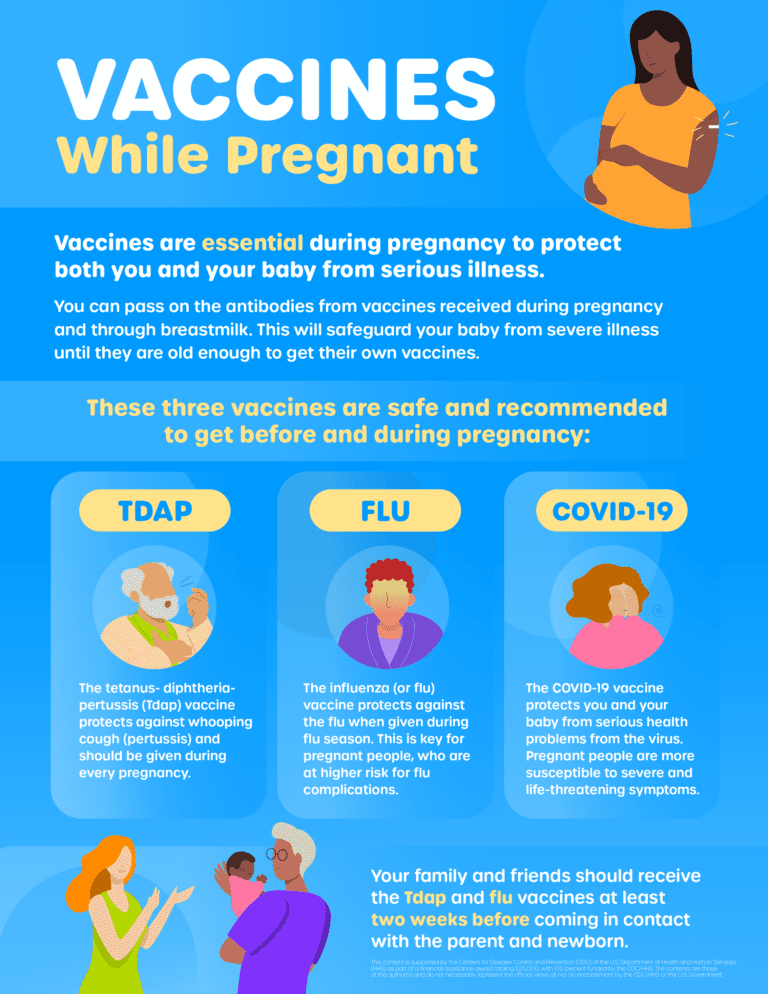
An influenza (flu) vaccine is the best way to protect yourself from the flu, even when you are pregnant. The vaccine is safe for pregnant people. The Centers for Disease Control and Prevention (CDC) recommends that pregnant women get a flu shot (vaccine) at any time (or trimester) of their pregnancy.
A flu shot not only helps prevent you from getting the flu, but it also will protect your newborn baby from getting the flu, too. Research shows that the flu vaccine protects children for up to six months if their mothers get the vaccine while pregnant with them. This is because the mother’s antibodies (an important part of the immune system, which protects your body from illnesses and disease) stay in the baby’s system after they are born.
Even if you are healthy, you need a flu shot. When you are pregnant, there are normal changes to your immune system that make you more likely to become severely sick if you get the flu. Having the flu increases your risk of developing pneumonia, a serious condition. You are more likely to be hospitalized if you get the flu while pregnant. Having a severe case of the flu while you are pregnant can also be bad for your developing baby. It increases your risk for going into labor early. Additionally, some studies have shown that fever associated with having the flu has been tied to neural tube defects and other negative outcomes for a developing baby.
If you did not get a flu shot while you were pregnant, you can get a shot after, even if you are breastfeeding. The flu shot is safe for women who are pregnant or breastfeeding. There is no increased risk of miscarriage when getting the vaccine during pregnancy.
Path to improved health
It’s best to get your flu shot each year before or during October. This ensures that you are protected before flu season is at its peak.
When you get a flu shot, the shot triggers your body to begin making antibodies to fight the viral infection. Antibodies are your body’s natural defense system used to help fight and kill harmful bacteria and viruses. It takes a few weeks after getting the flu shot for your body to develop the antibodies that will help ward off the flu. That is why it is important to get your flu shot in October or as soon as possible in the fall.
The American Academy of Family Physicians (AAFP) recommends that people 6 months and older should get a flu shot.
It is also important that anyone in close contact with your newborn baby be vaccinated against the flu. Other family members or caregivers should all get flu shots. They should be vaccinated to help prevent possibly passing the flu to the baby.

Things to consider
You should talk to your doctor before getting a flu shot if you:
- Have egg allergies
- Have a history of Guillain-Barre Syndrome
- Have ever had a reaction to a flu shot
- Have a fever
Getting sick with the flu is not a side effect of the flu shot. You cannot catch the flu just by getting a flu shot. There are, however, other side effects that sometimes occur after getting a flu shot. Most often, your only side effects will include soreness, redness and swelling around the injection area. Other less common side effects may include:
- All-over muscle aches
- Headache
- Fever
- Fatigue
- Nausea
Remember that side effects are usually mild. If your side effects seem severe, you should contact your doctor.
When to see your doctor
If you have flu symptoms and are pregnant, you should contact your doctor. Flu symptoms include:
- Fever
- Chills
- Headache
- Body aches
- Feeling unusually tired
- Stuffy nose
- Cough/sore throat
Your doctor may prescribe an antiviral medication. This medicine can’t cure the flu, but it can help shorten the span of the virus and make it less severe.
Questions to ask your doctor
- Why should I get a flu shot?
- Is it safe to get a flu shot while I’m pregnant?
- Is it safe to get a flu shot while I’m breastfeeding?
- Can getting a flu shot cause a miscarriage?
- Will I have any side effects from getting a flu shot?
- Where should I get a flu shot?
- What should I do if I get the flu while I am pregnant?
- Do I need to get a flu shot this year if I got one last year while I was pregnant but am now breastfeeding?
Resources
Centers for Disease Control and Prevention: Flu Vaccine Safety and Pregnancy
![]()
Copyright © American Academy of Family Physicians
This information provides a general overview and may not apply to everyone. Talk to your family doctor to find out if this information applies to you and to get more information on this subject.











